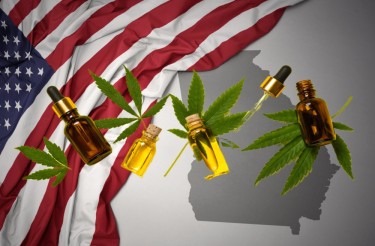
Little Five Points Pharmacy, situated in Atlanta, is among the nearly 120 independent pharmacies in Georgia that recently sought approval to distribute medical marijuana through a new state initiative. However, last week, the Drug Enforcement Administration (DEA) issued a warning to Little Five Points Pharmacy and other pharmacies statewide, asserting that such activities are illegal due to THC being categorized as a Schedule I controlled substance.
Expressing his dismay, Ira Katz, a pharmacist at Little Five Points Pharmacy, conveyed his disappointment, stating, “We always felt, as pharmacists, that this is a drug and it should be kept in the pharmacy. It should be regulated by the pharmacy. So we are very disappointed that the DEA is choosing to keep it out of the pharmacy, where it belongs.”
Katz, elaborating further in discussions with Atlanta First News, emphasized the significance of the issue, saying, “Because who better than your independent pharmacy, who knows your history and knows your medical history, can best dispense medical marijuana?”
Highlighting the potential benefits, Katz added, “For chronic pain, we believe that if we can get patients off these high doses of opioids, the hydrocodone, the oxycodone, the combinations of these things, then through the use of medical cannabis, we believe we can help contribute to slowing down this opiate crisis.”
In response to the DEA’s letters, Todd Heydel of Peachtree NORML criticized them as “ridiculous” and expressed frustration, stating in comments to Atlanta First, “We have children that are sick, that need medicine and need safe, legal access. And in Georgia, it seems like every time we try to take a step forward, there’s pushback.”
Supporters of Georgia’s medical marijuana system, including Michael Mumpter of Georgians for Responsible Marijuana Policy, have embraced the federal warning letter.
Mumpter expressed his expectation that, in the immediate future, pharmacies engaged in dispensing medical marijuana may need to halt their operations or face potential conflicts with the DEA, stating, “I imagine, in the short term, the pharmacies who started dispensing medical marijuana would have to stop or risk confrontation with the DEA,” in an interview with 11 Alive.
As of now, Georgia’s political figures and regulators have maintained a silence regarding the DEA’s warning. Several members of Georgia’s U.S. House delegation did not respond to requests for comments from Marijuana Moment this week. On the Senate side, there was no response from Sen. Raphael Warnock’s staff, despite his recent advocacy for social equity in marijuana reform during a committee hearing. Sen. Jon Ossoff’s office declined to provide a comment.
Requests for comments from Georgia’s Board of Pharmacy and Department of Public Health also went unanswered.
The DEA’s advisory could face complications due to a congressional budget rider that prohibits the Department of Justice from allocating resources to interfere with the implementation of state medical marijuana laws. Initially enacted in 2014, this provision was recently extended until at least February 2024. The potential violation of this provision by the DEA’s warning or enforcement actions remains unclear, with some advocates suggesting that the mere expenditure on postage for the letters could be considered a resource expenditure interfering with Georgia’s state-legal medical marijuana system.
Georgia’s Board of Pharmacy initiated the acceptance of applications from independent pharmacies to dispense low-THC cannabis oil, limited to 5% THC under state law, in October. The objective was to enhance medical marijuana access for patients, who were previously limited to just seven dispensaries established in the state since April.
According to an early report from The Atlanta Journal-Constitution in the same month, almost 120 pharmacies had applied to the Board of Pharmacy to distribute marijuana products from Botanical Sciences, one of the state’s licensed producers. Pharmacies were also authorized to dispense medical cannabis from Trulieve, the state’s other licensed producer.
Botanical Sciences’ Products Gain Traction in Georgia Pharmacies
By late October, at least three pharmacies had initiated the distribution of Botanical Sciences products, as highlighted in a company press release. The company’s website map indicates plans for over 100 additional pharmacies to open soon.
An Associated Press report suggests that if the sales of medical cannabis products were extended to all these locations, approximately 90% of Georgians would have access to a pharmacy selling marijuana within a 30-minute drive. It’s essential to note that the state’s authorization is limited to independent pharmacies and does not encompass larger chains like CVS and others.
The DEA issued warning letters to Georgia pharmacies during its ongoing assessment of a recommendation by the Department of Health and Human Services (HHS) proposing the rescheduling of marijuana under the Controlled Substances Act (CSA), potentially to Schedule III. The leak of this recommendation occurred in late August, and as of now, the DEA has not made a public response.
Although the Congressional Research Service (CRS) recently inferred that the DEA would likely adhere to the HHS recommendation based on historical precedent, it’s crucial to acknowledge that the DEA retains the authority to disregard the health agency’s guidance, as it holds final jurisdiction over the Controlled Substances Act (CSA).
HHS Documents Shed Light on Marijuana Rescheduling Considerations
In October, the Department of Health and Human Services (HHS) initially disclosed a redacted one-page version of the rescheduling memo. Subsequently, during the past week, the government released an additional 252-page set of documents about the review, with a majority of the information obscured.
Broadly, the new documents delineate recent scientific findings that have emerged since the previous denial of a rescheduling petition. HHS suggests that these developments may warrant reconsideration for the rescheduling of marijuana.
“The current review is largely focused on modern scientific considerations regarding whether marijuana has a currently accepted medical use (CAMU) and on new epidemiological data related to marijuana abuse since the 2015 HHS evaluation of marijuana under the Controlled Substances Act’s eight-factor analysis.”
HHS acknowledges that it has extensively analyzed data concerning the abuse potential of marijuana but underscores the complexity of this assessment, stating, “no single test or assessment provides a complete characterization.”
Earlier this month, six Democratic governors penned a letter to the Biden administration, urging the completion of the rescheduling process by the year’s end. The letter suggests that if marijuana is moved to Schedule III, pharmacies, as implied in the DEA’s letter to the Georgia pharmacy, would be authorized to dispense marijuana. However, pharmaceutical products would first need approval from the Food and Drug Administration.
The governor’s letter emphasizes that rescheduling cannabis aligns with ensuring a safe and regulated product that Americans can trust. Citing a poll indicating that 88 % of Americans support legalization for medical or recreational use, the letter underscores the consensus that while there may be differing opinions on recreational cannabis legalization, the cannabis industry is here to stay. The governors emphasize the importance of supporting state-regulated markets for the safety of the American people.
Bottom Line
Amid the DEA’s warning to Georgia’s independent pharmacies, epitomized by Little Five Points Pharmacy, the clash between regulatory constraints and the vision for localized healthcare provision is palpable. Pharmacist Ira Katz’s disappointment underscores this tension, while political figures’ silence and potential legal complications add an air of uncertainty to the state’s medical marijuana landscape. Simultaneously, the growing popularity of Botanical Sciences’ products indicates a rising demand, albeit with challenges in achieving widespread accessibility. The ongoing evaluation of marijuana rescheduling by the HHS, coupled with governors advocating urgency, signals a broader national conversation. Georgia stands at a pivotal moment, where the intersection of healthcare, regulation, and public sentiment will shape the future of medical marijuana access, leaving key questions unanswered.
GEORGIA SELLING WEED, READ ON…
GEORGIA WANTS PHARMACIES TO SELL MEDICAL MARIJUANA OIL?
- SEO Powered Content & PR Distribution. Get Amplified Today.
- PlatoData.Network Vertical Generative Ai. Empower Yourself. Access Here.
- PlatoAiStream. Web3 Intelligence. Knowledge Amplified. Access Here.
- PlatoESG. Carbon, CleanTech, Energy, Environment, Solar, Waste Management. Access Here.
- PlatoHealth. Biotech and Clinical Trials Intelligence. Access Here.
- Source: http://cannabis.net/blog/news/120-pharmacies-in-georgia-applied-to-sell-medical-cannabis-the-dea-says-hold-my-beer-and-shuts




